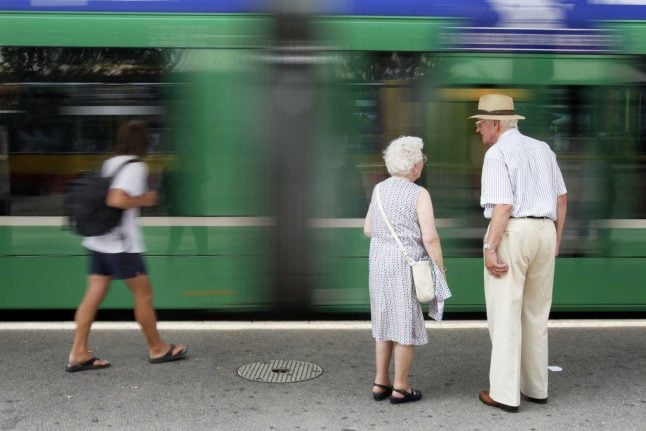A scientific task force set up to advise the Federal Council on the coronavirus, has recommended several steps to protect the elderly during a second wave of the coronavirus.
Given that much of the devastation caused by the virus came from it spreading through elderly homes, the researchers want to create extra barriers which prevent older people getting infected.
The plan showcases a different approach than that which was adopted during the lockdown which began in March.
Rather than locking down the population as a whole, the focus is set to be on those who are most vulnerable for the virus – i.e. those with pre-existing conditions but primarily older people.
Q&A: How will Switzerland's coronavirus tracing app work?
This includes reserving special cabins on public transport only for elderly people, creating areas in restaurants just for the elderly and marking off special footpath areas which can only be used by older people.
Creating special shopping windows – times at which only seniors can shop – at supermarkets has also been floated, after it was previously implemented in Ticino during the lockdown.
The task force said the priority was to ensure the safety of older Swiss while also ensuring that they are not excluded from public life. Seniors must be able to “participate in social life and at the same time be able to protect themselves adequately”, said the authors.
Another goal was to create a safer feeling in public spaces as “some seniors are afraid to go outside”.
Elderly or seniors car in train travel
One idea is to create a cabin or car which is purely reserved for seniors. This would not only ensure some separation from the general public, but would likely enable greater social distancing.
Infections scientist Manuel Battegay from the University Hospital Basel told Swiss tabloid Blick that special rules could potentially apply to the seniors cabin, while restaurant cars could also have areas set aside for seniors.
READ: Everything you need to know about Switzerland's new compulsory mask requirement
“Or a senior saloon in the restaurant, where the tables are far apart and the service personnel consistently wear protective masks?”
Special opening times
In Ticino in April, supermarkets introduced a special ’shopping window’ early in the day which was to be used only for seniors.
In the southern Swiss canton, which was the heaviest hit in terms of mortality, supermarkets were opened earlier than 10am for the exclusive use of seniors.
Ticino’s creation of the shopping window was done as a compromise. Initially, the canton – which shares a long border with hard-hit Italy – banned all over 65s from shopping completely, but faced negative feedback.
Footpaths and areas in restaurants only for elderly people
Some other ideas included making certain public and private spaces exclusively useable by seniors.
One idea would be to have areas of restaurants set aside for seniors, while another was to allow exclusive use of footpaths and walking tracks for the elderly.
Bans on visits to elderly homes are also likely to be reinstated, although many have adapted during the previous lockdown and built ‘visitation boxes’ through which residents could have contact with the outside world.
READ: How Swiss ‘visitor boxes' are again allowing nursing home visits
Otherwise known as ‘visitor zones’, the visitation boxes allow communication via phone or speakers while preventing transmission through a sheet of plexiglass or glass.

Besucherboxen – visitation boxes – in Swiss retirement homes. Photo: DPA
Elderly the most vulnerable
The median age of those who have passed away from the virus in Switzerland is 84 years. Of those who have died from the virus, 97 percent were suffering from one or more pre-existing conditions.
According to data from the Swiss Federal Office of Public Health, the most common condition suffered by the deceased is high blood pressure, which affected 63 percent of the deceased.
Just over one half – 57 percent – suffered from cardiovascular diseases, while 26 percent suffered from diabetes.
Who has been infected by the virus in Switzerland?
Age is a major factor in dying from the virus; however people of all ages have been infected in Switzerland.
Children between the ages of zero and nine – while at a lower risk of death and serious complications – are still contracting the virus in Switzerland, with 205 confirmed cases.
The next age group – ten-19-years-old – sees 942 confirmed cases, while 3,999 cases have been confirmed for those between 20-29.
The figure is slightly higher for people in their 30s and 40s, with 4,258 and 4,893 people confirmed in those age brackets respectively.
The most affected group in Switzerland is between the ages of 50-59, where 6,339 have been infected.
Those in their 60s (3,723), 70s (2,923) and aged 80 or older (4,120) have also been heavily affected.

Photo: FABRICE COFFRINI / AFP
Who has died from the virus in Switzerland?
The true dangers of the coronavirus can be seen by looking at mortality rates in Switzerland.
Only one person under the age of 30 has died from the virus, an infant in the canton of Aargau.
Five people in their 30s have passed away – a mortality rate of 0.12 percent.
Four people in their 40s in Switzerland has passed away from the virus – giving rise to a mortality rate of 0.08 percent.
While people in their 50s are the heaviest affected in terms of infections, there has been a relatively low death rate – with only 41 people in this age bracket dying due to the virus, or a mortality rate of 0.65 percent.
The death rates jump up for people in their 60s, with 125 people passing away (mortality rate of 3.35 percent), while 339 people in their 70s have died from coronavirus (mortality rate of 11.59 percent).
Swiss residents above 80 have been the heaviest hit however, with 1,167 people 80 or older passing away. This means that in Switzerland people over the age of 80 have a mortality rate of 28.45 percent.



 Please whitelist us to continue reading.
Please whitelist us to continue reading.
Member comments